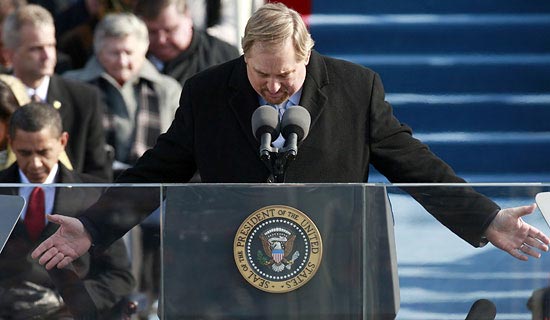Obama Inaugural Strikes Inclusive Note on Matters Spiritual
By Jason Reed | Jan 24, 2009

The clergy were Protestant, and so was the new head of state. But the inauguration Tuesday of President Barack Obama aimed for a much broader audience: an increasingly diverse America, where people want their beliefs acknowledged in the nation’s most important ceremony.
In his address, Obama referred to God and Scripture, saying, “The time has come to set aside childish things,” from the New Testament book of I Corinthians, Chapter 9.
But he also reached out to American secularists, calling the United States, “a nation of Christians and Muslims, Jews and Hindus – and nonbelievers.” The Center for Inquiry and the Council for Secular Humanism, based in Amherst, New York, called recognition in the inaugural address “truly historic and remarkable.”
The evangelical pastor Rick Warren, whose participation drew criticism from liberals and gay rights groups, directly invoked Jesus as expected in his invocation, but did so personally.
“I humbly ask this in the name of the one who changed my life,” he prayed.
He also quoted from the most important prayer in Judaism, the Shema, when he said, “Hear O Israel, the Lord is our God. The Lord is One,” and he called God “the compassionate and merciful one,” a phrase from Muslim devotion.
“His was as inclusive a prayer as an evangelical can give,” said Richard Mouw, president of Fuller Theological Seminary, a leading evangelical school in Pasadena, California.
The Reverend Joseph Lowery, a United Methodist considered the dean of the civil rights movement, focused on poverty and social justice.
“Lord, on the complex arena of human relations, help us to make choices on the side of love, not hate. On the side of inclusion, not exclusion. Tolerance, not intolerance,” he said.
He called the stage where Obama took his oath “this mountaintop,” a reference to the final speech of the Reverend Dr. Martin Luther King Jr. Lowery also quoted from the song known historically as “The Negro National Anthem.”
“God of our weary years, God of our silent tears,” he said, at the start of his benediction.
Prayers at inaugural ceremonies generally draw little attention, but this year was different. Obama spoke of his faith openly during the election, trying to change the image of the Democratic Party as hostile to religious voters. He has also welcomed nonbelievers, who tend to vote Democratic, in his speeches and public appearances since his earliest days of campaigning.
His supporters had been deeply upset by the prominence of the Christian right during the administration of President George W. Bush, and they watched to see what religious signals Obama would send at his swearing-in.
Warren is a Southern Baptist who wants to broaden the evangelical agenda to include environmental protection, fighting poverty and ending AIDS. He also backed Proposition 8, which banned gay marriage in his home state of California. Gay rights advocates were outraged that Obama had given Warren a place of honor at the ceremony.
Obama, who prays with Warren, said he wanted the event to reflect diverse views and insisted he remains a “fierce advocate” of equal rights for gays. The new president had also asked Bishop Gene Robinson of New Hampshire, the first openly gay Episcopal bishop, to give the opening prayer Sunday at an event at the Lincoln Memorial.
In his invocation Tuesday, Warren asked God to forgive “when we fail to treat our fellow human beings and all the Earth with the respect that they deserve.” He also prayed for “civility in our attitudes, even when we differ.”
Warren said the name of Jesus in four languages – English, Spanish, Arabic and Hebrew – and ended his invocation with “The Lord’s Prayer,” from the Sermon on the Mount. Rabbi Gary Greenebaum, who leads interreligious outreach for the American Jewish Committee, called Warren’s invocation “inclusive even as it was slightly exclusive,” for praying in Jesus’ name and ending with “The Lord’s Prayer.”
Some atheists and agnostics sued unsuccessfully ahead of the swearing-in to keep references to God out of the event.















